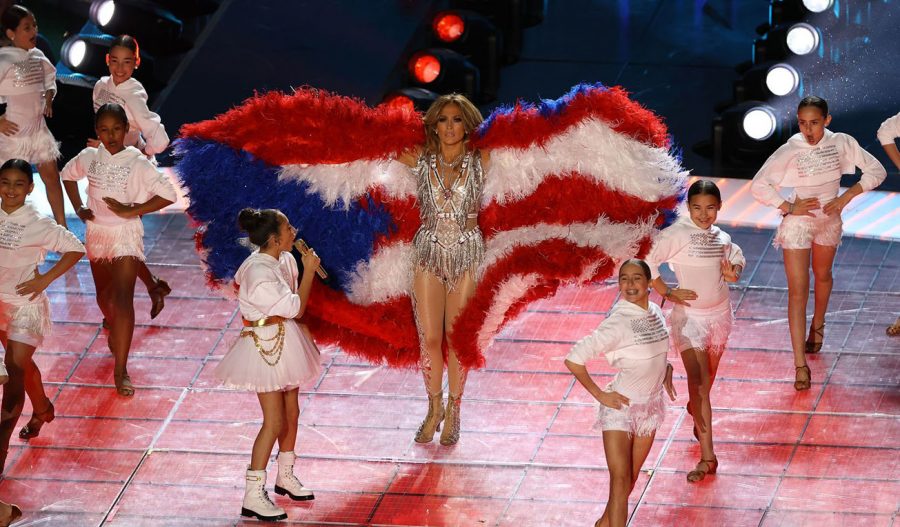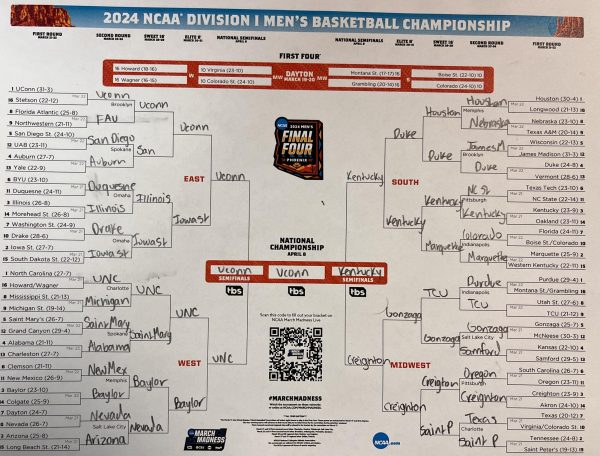Halftime Show Lacks Empowerment
On Feb. 2, millions of people gathered around TVs to watch the American sporting event of the year: the Super Bowl. While some were watching the Chiefs and 49ers battle it out on the field, others were waiting for the halftime show, the most entertaining part of the game to them.
This year, the show was performed by pop singers Shakira and Jennifer Lopez. Their vocals were undoubtedly impressive, and their dancing amazing, especially considering that they are old enough to be the mothers of high school students. Their performances were engaging, their songs upbeat and their sets elaborate, but did they consider their audience?
Billboard’s statisticians determined that 103 million people tuned into the halftime show. Of those, a large percentage were children, including my ten-year-old brother, whose thoughts consist of “that was quite a halftime show.”
It is rumored that rock performers are never invited to be in the halftime show because they are not “family-friendly.” While there is debate over whether rock is appropriate for children, there is no confusion over the fact that children and families are watching the mid-show entertainment.
Back in 2003 was the memorable performance by Justin Timberlake and Janet Jackson. This was scandalous to many and led to a much higher regulation of the halftime show performances. So why was this year’s let through? Why was it not OK for Janet Jackson to experience a compromising costume malfunction in 2003, but 17 years later, it is fine for Jennifer Lopez to pole dance in a manner reminiscent of her role in the R-rated “Hustlers” (while wearing perhaps less clothing than Jackson) next to children on stage? Is it a degradation of decorum or a rise in misogyny masked as feminist fervor?
I think both. The internet has allowed for a universal desensitization of the population. Anything is available to watch, so when something is not as bad as it could be, people are more relieved than anything. But just because anything can be seen, not everything should be displayed to a massive population of viewers.
Beyond that, however, is the blatant objectification of women that is not disappearing as our social norms become more “advanced.” Women presenting themselves solely as sex symbols is not empowering to me, it is disheartening. It presents the idea that a woman must be hyper-sexual to be successful or impressive in any way. And none of the show was done for the women’s comfort: singing is easier while standing on the ground rather than climbing a pole, and dancing is just as artistic when it consists of more than grinding.
The argument that women should be able to present themselves in any way they want is prevalent; however, very few stop to consider why there is such a subconscious drive in women to present themselves in such a shallow way. I believe that this societal pressure on women to be “sexy” is just subtler patriarchal control, as, unfortunately, many men wish to see this side of women alone, and because people think they are empowering themselves, they will become complacent and not fight for the freedom to dress comfortably and behave like well-rounded people.
I understand that this is these two women’s brand, and they did an excellent job at everything they did, but this should not be the NFL’s brand. If they hope to continue appealing to families, they ought to stop putting children on stage next to a nearly naked Jennifer Lopez. The image presented during the halftime show was discouraging as it subliminally told a new generation that girls’ worth is from their bodies and that men have the right to ogle.
Some are arguing the presence of a double standard, and they’re not wrong. They are claiming that everyone was happy with Adam Levine’s performance last year in which he took off his shirt and paraded his admittedly impressive heavily tattooed torso. The difference is that he had pants. And his “dancing” was mostly just walking around. The double standard here becomes evident: why are women so expected to be hypersexualized that to impress they must wear skimpy clothing and dance suggestively, while a man taking off his shirt and looking sultry is shocking?
None can deny that the show was an incredible, entertaining feat. The issue is not in the talent of these two women, but in the potentially damaging decision by those involved to feature them in a manner that eliminates their individuality in favor of presenting them as sex symbols. Encouraging these decisions is not the way to empower women, nor to raise a well-rounded and respectful generation. In the future, the Super Bowl performers should consider the wide audience they reach before putting on a show meant to shock people.









Judy C. Sale • Feb 20, 2020 at 4:54 pm
Applause, applause! I am so relieved to see evidence that your generation sees through the glitz to the harmful aspect of shows such as the super bowl halftime . With all of Jennifer Lopez’s talents, I was very disappointed in the focus on the sexual focus of costumes and “dance” if one wants to call grinding dancing. Keep those minds and values on the solid ground of family entertainment.